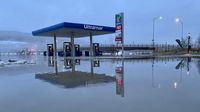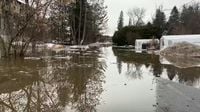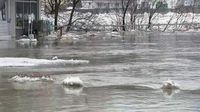Severe flooding has struck various parts of Quebec, compelling authorities to declare states of emergency and initiate evacuations as multiple rivers swell past safe limits. The emergency, prompted by unseasonably warm temperatures and recent heavy rains, particularly impacted municipalities like Drummondville, Beauceville, and Nicolet.
On March 17, Drummondville was one of the hardest-hit areas, with approximately 150 residences evacuated due to the rising waters of the Saint-François River, which recorded flow rates increasing from 250 cubic meters per second to 1255 cubic meters per second, according to Dominic Villeneuve, the city’s Director of Communications. “The water level will likely continue to rise,” he remarked, emphasizing the threat posed to local residents.
Residents displaced from the flooded areas were relocated to the Gérardin sports center as emergency shelters. Meanwhile, Beauceville officials worked diligently to manage the crisis as the Chaudière River overflowed. Reports indicate the river level surged dramatically late Sunday night, leading to significant urban flooding by early Monday.
The situation at Beauceville was initially regarded as 'major' before being reassessed to 'moderate' levels by midday. Local traffic and schooling were severely disrupted, as many roads, including Route 276, were closed indefinitely due to water accumulation. The Centre de services scolaire de la Beauce-Etchemin announced the suspension of classes at various institutions, including the Polyvalente Saint-François and other primary schools.
Additional areas such as Saint-Nicéphore faced evacuations, with emergency services deploying boats to assist residents. The local emergency response highlighted the breadth of the situation, with water levels fluctuated rapidly across numerous waterways. Observations from Public Security confirmed the classification of multiple rivers under moderate or minor flooding warnings, prompting heightened vigilance.
Compounded by community concerns, the floodwaters have impacted the Nicolet filtration plant, crippling drinking water supplies for over 13,000 residents from Nicolet and nearby municipalities. Mayor Geneviève Dubois communicated to the public the gravity of the situation, advising them against consuming tap water and emphasizing the need to conserve what little water could still be accessed for basic tasks. "We have requested citizens to limit their water consumption due to the flooding," she stated, as authorities began distribution from available reserves.
Mobile water distribution points were set up immediately, with people required to show proof of residence to receive assistance. Emergency shelters were established to provide relief to those without homes due to the flooding. The measures included the provision of potable water to senior residences, schools, and health establishments hard-hit by the water supply crisis.
Cleanup and recovery efforts began almost immediately, where civil defense teams utilized hovercrafts to break up ice jams, which had formed alongside numerous rivers adding to the flooding issues. Sylvain Gallant, the Regional Director of Civil Security, noted the prompt response efforts amid the disastrous circumstances. "A hovercraft was deployed to break the ice jam," Gallant stated, underscoring the quick action taken to mitigate damage.
While local and provincial officials remain focused on response, the next few days will be equally important as recovery and monitoring efforts continue. With weather forecasts showing continued warmer conditions but minimal rainfall, authorities have urged the public to remain cautious and respect road closures to avoid additional accidents.
Currently, over ten rivers across Quebec remain under close supervision. Floods have also been reported throughout regions such as Estrie and Lanaudière with various communities dealing with extreme weather-induced challenges.
Government representatives have indicated resolve to support affected communities through this crisis, as Quebec aims to not only provide immediate assistance but to explore long-term infrastructure solutions to prevent such severe flooding from occurring again. “We will stay vigilant and continue to assist municipal teams as time progresses,” affirmed François Bonnardel, the Minister of Public Security.
Overall, the flooding crisis symbolizes the pressing need for enhanced disaster preparedness and sustainable infrastructure to handle the increasingly volatile weather patterns Quebec has recently experienced. Continued efforts will be necessary, as many residents are still awaiting the restoration of safe living conditions.




